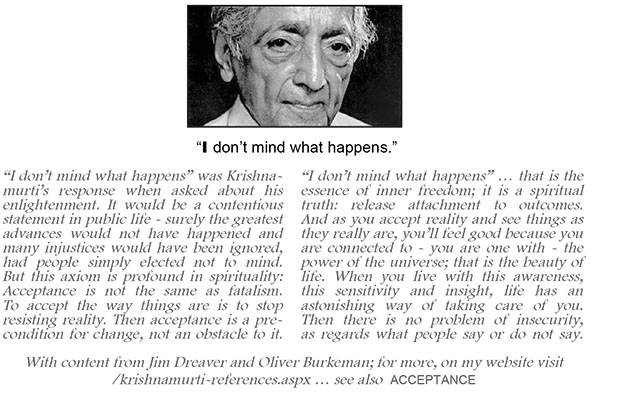I often reference Jiddu Krishnamurti … on this page I summarise my K blogs.
If Krishnamurti is new to you, you may want to begin here.
There is an instructive new website The Life of Krishnamurti, published by the Krishnamurti Foundation of America (KFA).
This speech Krishnamurti gave before the Theosophical Society in 1929 to denounce his membership - when he was 34 years old - summarizes his work:
"I maintain that Truth is a pathless land, and you cannot approach it by any path whatsoever, by any religion, by any sect. That is my point of view, and I adhere to that absolutely and unconditionally.
"Man cannot come to it through any organisation, through any creed, through any dogma, priest or ritual, not through any philosophical knowledge or psychological technique. He has to find it through the mirror of relationship, through the understanding of the contents of his own mind, through observation and not through intellectual analysis or introspective dissection.
"Truth, being limitless, unconditioned, unapproachable by any path whatsoever, cannot be organised; nor should any organisation be formed to lead or coerce people along any particular path. If you first understand that, then you will see how impossible it is to organise a belief. A belief is purely an individual matter, and you cannot and must not organise it. If you do, it becomes dead, crystallised; it becomes a creed, a sect, a religion, to be imposed on others.
"This is what everyone throughout the world is attempting to do. Truth is narrowed down and made a plaything for those who are weak, for those who are only momentarily discontented. Truth cannot be brought down, rather the individual must make the effort to ascend to it. You cannot bring the mountain-top to the valley."
J.K.
What is meditation? Meditation is unpremeditated art.
"Meditation is your daily life without any outside influences, any 'wisdom' of others. To have that sense of total freedom, to deny everything that man has ever taught about meditation, about silence, about truth, about eternity … to be free of other people’s knowledge completely. To deny your gods, your sacred books, your traditions, your beliefs … everything wiped away. Which means you are totally independent of anything … which means you are free of fear. Without love and compassion there is no meditation. So life, living everyday in this world - which is corrupt, immoral, destructive, without integrity - living in this world, you have that sense of total freedom, absolute freedom, because you have denied everything that man has thought out. When the mind is totally free from all psychological accumulation, when there is absolute denial of this, when the mind has become absolutely quiet, that illumination is to see things clearly as they really are … that is meditation. That is benediction, of living a life which is whole."
Here is a link to a Krishnamurt Biography and a snippet from David Bohm's introduction to K on the Krishnamurti Australia website:
"Krishnamurti constantly emphasizes that he is in no sense an authority. He has made certain discoveries, and he is simply doing his best to make these discoveries accessible to those who are able to listen. His work does not contain a body of doctrine, nor does he offer techniques or methods, for obtaining a silent mind. He is not aiming to set up any new system of religious belief. Rather, it is up to each human being to see if he can discover for himself that to which Krishnamurti is calling attention, and to go on from there to make new discoveries on his own."
Krishnamurti, when asked about his secret to enlightenment, said ...
"I don't mind what happens"... the most profound saying ever.

The above is from my essay KRISHNAMURTI in my book en.light.en.ment
Here is the original article on Krishnamurti by Oliver Burkeman
"Krishnamurti rarely ever talked about himself or his own process, and now he was about to give us his secret! He was in many ways a mountaintop teacher - somewhat distant, seemingly unapproachable, unless you were part of his inner circle. Yet that’s why we came to Ojai every spring, to see if we could find out just what his secret was. We wanted to know how he managed to be so enlightened, while we struggled with conflict and our numerous problems.
"There was a silence. Then he said in a soft, almost shy voice,
'You see, I don’t mind what happens.' "
Jim Dreaver talks about a meeting with Krishnamurti when the well known words were uttered ... great story, Jim. (Here I reprint the story.)
Here is a link to a most wonderful essay Krishnamurti wrote in 1909 when he was fourteen years old, At The Feet Of The Master ... it is an initiation to the Path.
This is a video with a first person account of meeting with JK, with Sadhguru.
I know nothing about him - or the organization behind him - but I like this talk.
I have been blogging about K for many years:
Krishnamurti on meditation
... namely, what meditation is not
This Light in Oneself
Krishnamurti on the subject of meditation
Krishnamurti on Truth
Jiddu Krishnamurti:
"Truth is a pathless land."
What is religion?
Krishnamurti sheds light on a question you may not have an answer for: What is religion?
The Path: At the feet of the Master
"If you know, it is your duty to help others to know."
At the feet of the Master is a spiritual classic attributed to Jiddu Krishnamurti, written when he was fourteen years old
Krishnamurti and the fresh, young mind
Krishnamurti extols the virtues of the fresh, young, indeed the empty mind
The quiet Mind
Why does Krishnamurti advocate for a quiet mind?
Because it is the way to the truth.